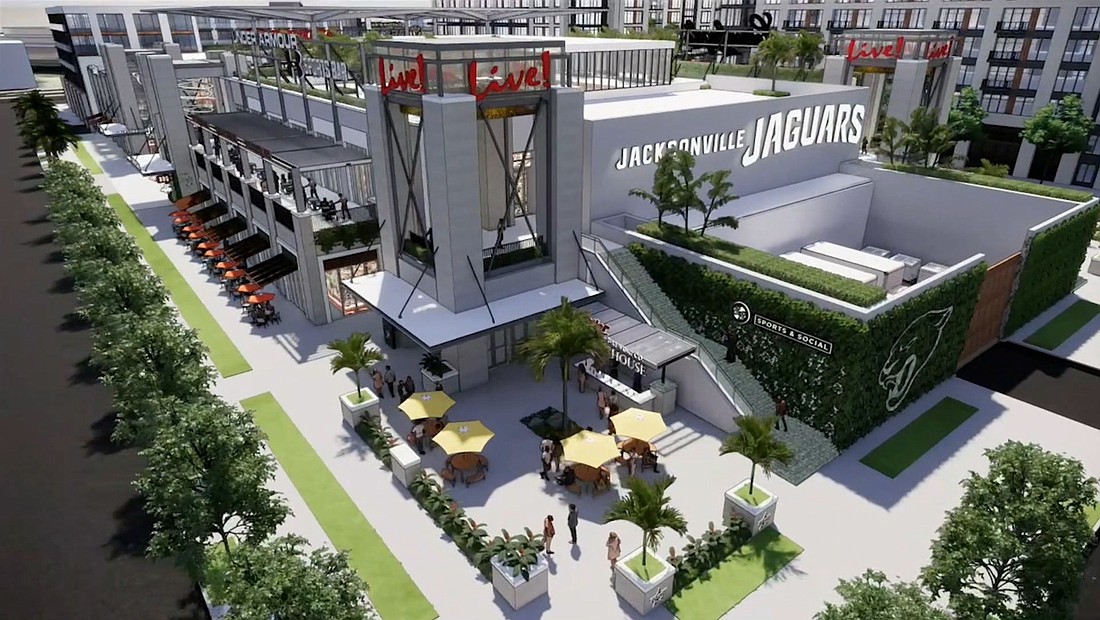
A financial impact analysis of the $445 million Lot J development commissioned by the Jacksonville Jaguars shows additional retail space and assumes $402.2 million in tax revenue over 30 years.
The Jaguars and the city released the analysis Oct. 22 after City Council Auditor Kim Taylor told the Finance Committee on Oct. 20 that the mayor’s office had not provided complete financial projections to her office.
The report is from Chicago-based C.H. Johnson Consulting Inc., contracted by the Jaguars’ development team.
Johnson Consulting calculates Lot J would support 1,070 full-time equivalent jobs when it is operating and create a $456.6 million economic impact over 30 years beginning in 2022.
Mayor Lenny Curry said in a news conference Oct. 22 that the city used the report to outline job creation totals and economic impact figures when the development deal was announced Oct. 5.
Curry said Oct. 5 that Lot J would produce $100 million in annual economic output and create 2,300 construction jobs and at least 1,000 permanent jobs.
City Director of Public Affairs Nikki Kimbleton said city officials obtained the report from the Jaguars on Oct. 22. A cover letter on the analysis is dated Oct. 21.
“So that was their (the Jaguars) financial projections that I’ve used in my comments,” Curry said. “We obtained them from them to distribute to the media.”
Lot J is a proposed development of offices, apartments, retail and entertainment venues and a hotel west of TIAA Bank Field Downtown.
The project is a joint venture of the city, Jaguars affiliate Gecko Investments and The Cordish Companies of Baltimore.
The report appears to increase the amount of retail space proposed at Lot J to 115,000 square feet. That is more than the 75,000 square feet outlined in a term sheet released Oct. 5.
Jaguars Senior Vice President of Communications Dan Edwards said in an email Oct. 22 that the Live! District arena will have 40,000 square feet of retail space and the remaining 75,000 square feet will be ground-level space in the two mid-rise residential buildings.
Lot J also includes the Live! District with an entertainment center with bars and restaurants as well as indoor and outdoor facilities; 40,000 square feet of class A office space; two residential buildings with 400 rental apartments; a 150- to 200-room hotel; 700 structured parking spaces for the residential buildings; and 700 surface parking spaces.
Curry administration officials negotiated a deal calling for the city to pay for $50 million of the proposed $100 million Live! District entertainment venue that will be owned by the city.
The city would pay for $77.4 million in site infrastructure improvements, including the surface and structured parking.
The city also would issue a $65.5 million, 50-year no-interest loan to the developer, and $25 million in tax and completion grant incentives for the residential buildings and hotel.
Projection uncertainty
The report’s cover letter includes a disclaimer that states Johnson Consulting used trends and assumptions in the impact analysis “which can result in differences between projected and actual results.”
The analysis acknowledges the impact of the COVID-19 pandemic and economic downturns could not be factored into the final numbers.
“Johnson Consulting has no responsibility to update this report for events and circumstances occurring after the date of this report,” the document states.
“As the scale of the global COVID-19 pandemic impact is still uncertain, our report outlines our assumptions based on experience from previous economic disruptions. But the actual impact will not be known from the foreseeable future.”
Curry comments
Curry said Oct. 22 that the Council auditor requested his administration provide its return on investment analysis.
Taylor needs the information to analyze legislation authorizing city-backed incentives financed by $208 million in public debt.
Council President Tommy Hazouri declined to introduce the legislation Oct. 13 because it was filed without a parking agreement with the developer.
“The Council Auditor has asked for an ROI. We’re going to give them one, but that’s not part of our investment policy because a return on investment calculation based on a facility that we own is just not in the course of ordinary business,” Curry said.
The Johnson Consulting analysis is not the same as an ROI study, which measures the economic benefit against the public investment for a project and focuses on tangible financial gains or losses to city revenue that is derived from an investment, according to the city’s Public Investment Policy.
Curry said that because the Live! District will be publicly owned and taxpayer investment in the Lot J term sheet is not tied to job creation, it doesn’t fall under the ROI requirements in the public investment policy.
“The economic impact was not part of the deal,” Curry said. “When I stated the jobs and the economic impact, that’s gravy. This deal is a city-owned facility where a private developer is putting hundreds of millions of dollars into it and we will lease it back to them.”
Curry said the Lot J deal for the Live! District is a “dollar-for-dollar” match, not tax-based incentives.
The latest version of the public investment policy updated by a Council special committee in June 2016 does not exclude an ROI evaluation for deals involving city-owned venues.
“Projects will be evaluated on whether they provide a return on investment (ROI) to the City,” the policy states. “Projects will also be evaluated against standard underwriting criteria and an assessment of the public investment risk associated with the project.”
Curry didn’t address the property tax incentive and completion payment linked to the residential buildings and hotel that will be owned by the developer.
The Curry administration proposed a 20-year, 75% property tax rebate through a $12.5 million Recapture Enhanced Value Grant for the residential property.
Before heading to Council, the REV Grant will have to be approved by the Downtown Investment Authority board, which typically is provided a project’s ROI by its staff before a final vote.
The city would offer a $12.5 million completion grant payment for the hotel.